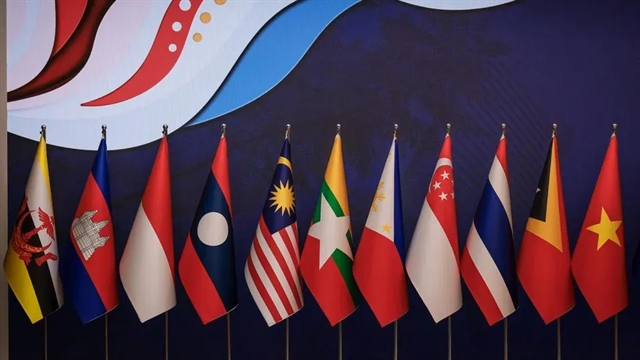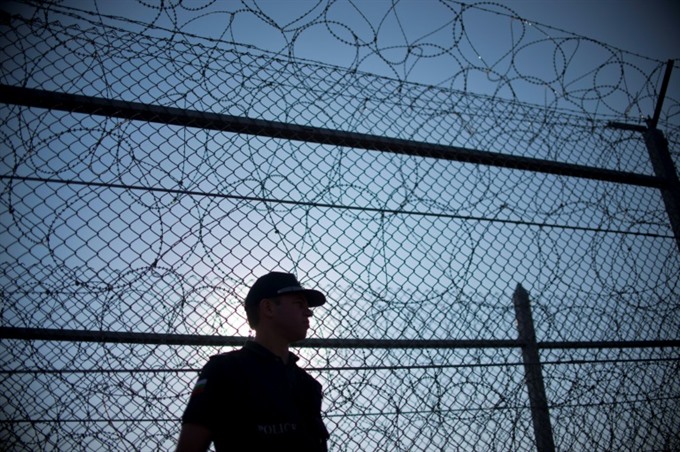 World
World

The leaders of 10 EU countries will hold crisis talks on migration in Brussels Sunday aimed at countering movement of asylum seekers between member nations which is a source of tensions within the bloc.
 |
| The influx of migrants is causing fresh divisions in Europe.—AFP/VNA Photo |
BRUSSELS — The leaders of 10 EU countries will hold crisis talks on migration in Brussels Sunday aimed at countering movement of asylum seekers between member nations which is a source of tensions within the bloc.
European Commission chief Jean-Claude Juncker called the meeting at the last minute as the issue causes fresh divisions in Europe, three years after the bloc faced its biggest migration crisis since World War II.
German Chancellor Angela Merkel’s government coalition is under threat from the issue and there has also been a row over a boatload of migrants rescued from the Mediterranean who were turned away by Italy’s new right-wing government.
Hungary meanwhile passed a law on Wednesday criminalising aid groups that help migrants.
"I am convening an informal working meeting on migration and asylum issues in Brussels on Sunday, in order to work with a group of Heads of State or Government of Member States interested in finding European solutions ahead of the upcoming #EUCO (European Council)," Juncker said on Twitter Wednesday.
Merkel, French President Emmanuel Macron, Spanish Prime Minister Pedro Sanchez, Maltese Prime Minister Joseph Muscat, Dutch Prime Minister Mark Rutte and Belgian premier Charles Michel have all confirmed their attendance, officials said.
The leaders of frontline states Italy and Greece will also be involved, as well as Austria and Bulgaria, who are the incoming and outgoing holders of the EU’s rotating six-month presidency, European sources said.
The meeting comes ahead of a full summit of all 28 European Union leaders next Thursday to discuss plans to overhaul the bloc’s asylum system, which has been under severe pressure since the migration crisis exploded in 2015.
But even as numbers crossing the Mediterranean have dropped since then, efforts to reach a consensus have been thrown into turmoil by fresh developments in Europe as countries disagree over who should host new arrivals.
Obligations on asylum seekers
According to a draft conclusion for Sunday’s meeting seen by AFP, they would undertake to speed up the return of asylum seekers from one EU state to another when the latter country is regarded as responsible for processing their application.
This is already provided for in the Dublin Regulation, which generally assigns responsibility for asylum seekers to the nation of first entry, but which is only partially applied and the principle of which is disputed by countries such as Italy.
This situation spurred the threat by Germany’s hardline Interior Minister Horst Seehofer to turn back asylum seekers registered in another country without the agreement of its neighbours, a measure rejected by Merkel who is against unilateral initiatives to deal with the crisis.
"Unilateral, uncoordinated measures would not only be less effective, but severely damage the process of European integration and put the achievements of Schengen at risk," the draft says, indicating support for Merkel.
Several proposed measures are aimed at countering "secondary movements" within the EU, "as there is no right to freely choose the member state where to apply for asylum," says the text, which could change before Sunday.
"We will impose on asylum seekers (sanctionable) obligations to remain in the competent member state," which must deal with their request. They would also have access to "social assistance" only in that country.
The text said checks to control outbound travel should also be made at bus and train stations and airports by police and private transport companies.
It also proposes stepping up measures taken the last three years to strengthen co-operation with north African countries, to speed up the return of illegal migrants and asylum seekers to their countries of origin and to support the Libyan coastguard.
The EU border agency Frontex would also be revolutionised into a "true EU border police" with the number of officers increasing to 10,000 by 2020, a move Italy has been pushing for.
Catastrophe
The draft text also calls for "a very swift completion of the reform of the Common European Asylum System".
The Dublin Regulation is a major source of division as it puts a disproportionate burden on frontline states such as Greece and Italy.
The European Commission has for two years been proposing to modify it, notably by introducing an automatic distribution of asylum seekers in the EU at times of crisis such as in 2015.
Last week’s row over the fate of more than 600 migrants on the Aquarius rescue boat helped thrust the migrant issue back to the top of the EU agenda.
Italy refused to let the vessel dock at its ports, sparking a war of words with Malta and prompting Macron to accuse Rome of "cynicism and irresponsibility".
Meanwhile after allowing more than one million asylum seekers into Germany since 2015, sparking a strong domestic backlash against immigration, Merkel is now fighting for her political future.
Austria’s Chancellor Sebastian Kurz on Wednesday raised the spectre of a "catastrophe" similar to the events of 2015 if Europe does not agree a common response. —AFP




